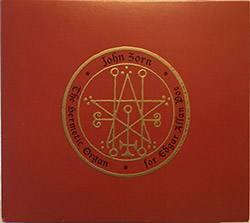
Eight years and six releases into the project, we have come to the point where John Zorn's Hermetic Organ has shed its superficial novelty. Bills headlined with "John Zorn. Solo organ improvisations. Tonight!" may still elicit excitement, but not because it seems such a deviation for the man who made our ears bleed with Naked City and compelled us to dance our way through history, heaven, and hell in his various Masada troupes. By now, we are aware of Zorn's eminent musicality and creativity, his ability to shatter convention in a way that few others can.
And here I am with the Hermetic Organ Volume 6: For Edgar Allen Poe. What can one say about such a recording? First, the basics. It is divided into two tracks: a quiet meditation on "The Masque of the Red Death," and a louder, more cavernous interpretation of "The Fall of the House of Usher." These pieces are weird, not in an aggressive or genre-bending manner (I am not sure what genre this would fall into that is not simply defined by the instrument), but in a subtle way. Yes, Zorn plays some menacing layered overtones. But he also wrestles out of the organ strange hisses, sizzles, and honks, distant screams and deep rumblings in a manner in which no sound, however tortured, sounds extraneous. In other words, this is not just a solo sax record transposed onto the organ, an endeavor which would likely have failed. Rather, the physicality and sonic properties of the instrument have forced Zorn to modify his approach — but not his indefatigable drive for unusual timbres — and economize his sometimes frantic tendencies. Melodies are brief and fade in and out of the funereal ambient, susurrating haze. Shock is laid aside in favor of prolonged moments of tension created out of simple resonances or even a solitary, shrieking whistle. The result is jarring.
Most striking about For Edgar Allen Poe is not just the sheer range of sounds Zorn elicits from the organ but also the oppressively fatalist mood he creates. Like Poe who leaves no question of the morose course of his stories, Zorn starts dark and only gets darker. And, much like Poe, he plays with this gloom in inventive ways. The reader knows the house of Usher is doomed from the very first description of the "dull, dark and soundless day" whose "clouds hung oppressively low in the heavens." The reader of "The Masque of the Red Death" can sense early on that "the happy and dauntless and sagacious" Prospero will not remain so for very long. It is not a question of the predetermined destruction that holds the reader, but the ways in which the story wends, the slowly revealed specificities of inescapable decline, and the ghastly details of the character's ultimate end that keeps one enthralled. The same applies to For Edgar Allen Poe. It is a grim journey, but one knows that from the beginning. What makes this album so unique is not the beginning and the end, but the wondrously dark and creative narrative that connects the two.
Comments and Feedback:
|



